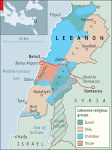We confirm to our brothers in Beirut that we will withdraw arms from the streets and hand security over to the army, but we will continue our civil disobedience.So Hezbollah, Amal, and the Syrian Social Nationalist Party have left their posts in West Beirut and the military has taken control of all conflicted neighborhoods. In exchange, the government has agreed to reverse its two decisions that started this conflict. They will now back off Hezbollah's communication system and reinstate the airport's security chief. PM Siniora's governing coalition stopped short, however, of meeting two of the opposition's other demands: the formation a unity government and electoral reforms. Therefore, Khalil declared, Amal, Hezbollah, and the SSNP will continue engaging in civil disobedience until these issues are resolved. This means that they will continue blocking the roads to the airport and most likely will also continue to block the port.
We grabbed something to eat in Hamra this evening and, indeed, the opposition's militias were no longer there. The streets were relatively empty, though we did see more pedestrians and cars than yesterday.
MP Walid Jumblat, whose Druze militas in the Chouf had been engaging in fierce fighting with Hezbollah, urged his followers and the rest of Lebanon to exercise restraint.
As I said earlier, commentary and analysis are popping up all over now; here is a take on the situation, which you won't see in the New York Times, from Electronic Lebanon editor, Samah Idriss:
Clearly there is a strategy from the government and pro-government forces to portray Hizballah as the outsiders, to try to portray Hizballah as a force coming to change the nature of Beirut by bringing in Shi'ite elements, Iranian elements, Persian elements, barbarian elements, etc. All oriental stereotypes that mainstream western media and some mainstream Arab media will quickly adopt. It is not certain, however, that this portrayal for Hizballah could work in the Arab media because Hizballah is widely respected as the major defender for the Arab cause, for the Palestinian cause.
Across the Middle East the mainstream Sunni populations don't view Hizballah or its leader Hassan Nasrallah as a sectarian leader or simply a Shi'ite leader. However, the mainstream pro-government media in Lebanon attempt to portray Hizballah as a completely sectarian movement, in tune with the political lines fostered by the governments of Saudi Arabia, Egypt, Jordan, France and the US.As Idriss suggests, negative portrayals of Hezbollah are not unique to Western media and politicians. But while I certainly have met plenty of people in Lebanon who think Hezbollah (and often, by extension, Shia) are nothing but a bunch of terrorists, the difference here is that nearly everyone at least understands that Hezbollah is a political party that represents, governs, and defends a large number of people. Even Siniora today, in his speech, expressed gratitude for Hezbollah's ongoing defense of Lebanon from continual Israeli invasions (speaking of which, by the way, we saw what was most likely an Israeli jet fly high over Beirut this afternoon, violating UN resolution 1701, as it regularly does).
This is not to say that you should discount all Western representations of Hezbollah, or Lebanon more generally. Cal Perry has been giving very good, nuanced reports on CNN, which actually mention not only the July 2006 war (something most American journalists conveniently forget when they discuss Lebanon's recent history) but also the rise in support for Hezbollah during and after that war. I wonder, though, whether CNN in America is showing these same reports, or if it only plays those from its more conservative journalist in Lebanon (whose name I can't remember right now). The CNN we watch here is specifically for international audiences.
In addition to Barack Obama, John McCain is now weighing in on the situation as well.

No comments:
Post a Comment